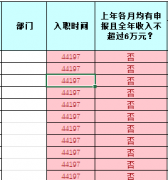问题描述
我有两张桌子.一个用于用户,一个用于帖子.users 表有以下字段:
I have two tables. One for users and one for posts. The users table has the following fields:
id, username, password, created_at, modified_at
posts 表有以下字段:
The posts table has the following fields:
id, user_id, title, body, created_at, modified_at
当我使用如下查询时:
SELECT * FROM `users` LEFT OUTER JOIN `posts` ON users.id=posts.user_id
并使用 PDO 获取结果:
And fetch the results using PDO:
$sth = $this->$default_connection->prepare($query);
$sth->execute();
$sth->fetchAll(PDO::FETCH_ASSOC);
返回的数组会覆盖所有具有相同名称的列,例如 id、created_at、modified_at,如下所示:
The returned array overwrites all the columns with the same names like id, created_at, modified_at like this:
Array
(
[0] => Array
(
[id] => 1
[username] => johnSmith
[password] => 2348r7edf8s79aa0230
[created_at] => 0000-00-00 00:00:00
[modified_at] => 0000-00-00 00:00:00
[user_id] => 18
[title] => First Post
[body] => Just testing...
)
)
用户的 id 字段未显示,而是被帖子的 id 覆盖.created_at & 也是如此.modified_at 字段.
The id field for the user is not shown, instead overwritten by the id of the post. Same goes for the created_at & modified_at fields.
我相信我可以通过使用别名或类似的东西来解决这个问题:
I believe I can solve this problem by either using aliases or something like this:
SELECT
users.id,
users.username,
users.password,
users.created_at,
users.modified_at,
posts.id AS postId,
posts.user_id,
posts.title,
posts.created_at AS postCreatedAt,
posts.modified_at AS postModifiedAt
FROM `users`
LEFT OUTER JOIN `posts` ON (users.id=postId)
或类似的东西,但我想知道是否有一种方法可以做到这一点,而无需每次我想区分两个同名的列时手动写出每一列的名称或别名?是否可以做类似的事情:
Or something similar, but I was wondering if there was a way to do this without manually writing out the name of every single column or an alias for every time I want to distinguish between two columns of the same name? Is it possible to do something like:
SELECT users.* AS User and posts.* AS Post from `users` LEFT OUTER JOIN ON (User.id=Post.user_id)
让它自动为每一列使用别名?或者有没有其他更快/更方便的方法来做到这一点?或者我可以这样做而无需自己定义任何别名吗?
And have it automatically use aliases for every column? Or is there any other faster/more convenient way to do this? Or can I do this without having to define any aliases myself?
谢谢
推荐答案
我觉得在这种情况下别名是完美的
I think alias is perfect in this case
SELECT table1.column AS column1, table2.column AS column2
FROM table1
LEFT JOIN table2
ON table1.column = table2.column
为了节省一些打字时间,请使用表格别名:
To save you some typing time, use table aliases:
SELECT t1.column AS column1, t2.column AS column2
FROM table1 AS t1
LEFT JOIN table2 AS t2
ON t1.column = t2.column
这篇关于PHP/MySQL:在无别名的联接查询中获取多个同名列?的文章就介绍到这了,希望我们推荐的答案对大家有所帮助,也希望大家多多支持跟版网!



 大气响应式网络建站服务公司织梦模板
大气响应式网络建站服务公司织梦模板 高端大气html5设计公司网站源码
高端大气html5设计公司网站源码 织梦dede网页模板下载素材销售下载站平台(带会员中心带筛选)
织梦dede网页模板下载素材销售下载站平台(带会员中心带筛选) 财税代理公司注册代理记账网站织梦模板(带手机端)
财税代理公司注册代理记账网站织梦模板(带手机端) 成人高考自考在职研究生教育机构网站源码(带手机端)
成人高考自考在职研究生教育机构网站源码(带手机端) 高端HTML5响应式企业集团通用类网站织梦模板(自适应手机端)
高端HTML5响应式企业集团通用类网站织梦模板(自适应手机端)